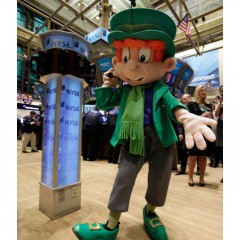4 CHARTS THAT WILL MAKE YOU COMFORTABLE WITH CHAOS FOR THE WEEK AHEAD
click chart to enlarge
THE WALL STREET FOOL
"There is a time for all things, but I didn't know it. And that is precisely what beats so many men on Wall Street who are very far from being in the main sucker class. There is the plain fool, who does the wrong thing at all times everywhere, but there is the Wall Street fool, who thinks he must trade all the time. No man can always have adequate reasons for buying and selling stocks daily - or sufficient knowledge to make his play an intelligent play." --- Jesse Livermore There is a certain degree of nobility that comes with the act of doing nothing in the business of finance. It is a counter-intuitive trait that does not digest easily with most investors. Yet it is an absolute key building block in the act of creating any formidable wealth within a portfolio of stocks. We are looked at from a very early age not by what we accomplish through stillness, but what we accomplish through action. It is believed that in action is where victory is born. If you are injured by a certain action, then you simply take another action to "get through" your injury, as action is the only way to victory. If, on the other hand, you are injured through the act of stillness, you are automatically labeled as being lazy, incompetent and unable to perform the essential task of taking action. The very act of daydreaming. Imagining. Introspection. They all run completely counter to the key attributes that create success according to popular perception. What is missed by those who constantly preach action, whether in popular books, blog postings or in any form of media is the moments in between when the act of stillness leads to a clear path of action. You cannot have a reason to act at every single moment. Then your actions become diluted within a sea of inconsequential motion. Action should have purpose. And purpose is derived through stillness. In my case, in particular, I have clearly entered a point in the life of the current portfolio holdings (WMIH, HH, IWSY & KFS) that any action taken will be forced. There is nothing to do but sit. Volume is extremely low as all the current portfolio holdings are in between catalysts. To force an action here by attempting to discover momentum that would create basis points would be foolish. It is a negative expected value proposition as it is difficult to duplicate with a high success rate AND it takes away from the key focus of the portfolio that is backed by a strategy seeking asymmetric (overused financial jargon,...
THE RISE OF THE STUDIO-GANGSTER ON WALL STREET
Urban Dictionary defines a "Studio Gangster" as follows: Fake G's that pretend to be from the streets by rapping about it. Much like studio gangsters who are seemingly a thorn in the side of the hip-hop community, there dwells a large band of studio-analysts on Wall Street who will pretend to be bulls or bears by rapping about it, although their raps don't rhyme. They pretend because they simply have no choice. A fervent lust for competent analysis doesn't reside within these individuals, creating a mutant form of trend-follower who will simply hop on the path of least resistance, curve-fitting their analysis to meet the circumstances they are presented with. Just a couple short years ago that the voracity of the bull market was in constant doubt. Numerous reasons were being cited. The same reasons that pop up today at the first sign of trouble: job growth, corporate earnings, inflation, deflation, interest rates, EM concerns, Chinese real estate, fiscal policy, monetary policy, oil prices, Middle Eastern instability, overvaluation. You get the picture. There were very few, if any, who base their reasoning in the devoid and depraved landscape of fundamental, macro analysis that were calling for such levels in the major market averages. Now that fundamental events that worried these studio-analysts to the point of absurdity have vanished into the portion of the heavens that is a loving home for all forms of degraded analysis, the same crowd has reformed themselves into a nouveau bullish class of investor who is patting the back of the market, asking for whatever validation they can get before the tides shift, once again. The problem here is not that these investors signal any kind of long-term top for the markets. They certainly do not. The financial markets can make large groups who are otherwise dull, shine bright. Likewise, they can make those who are bright, look extremely dull. The type of anecdotal sentiment analysis that relies on the bullishness of mailmen and taxi drivers to call bull market tops is just as flawed as the fundamental, macro analysis that drives your typical studio-analyst. Trends persist for far longer than even the most brilliant investor can imagine and they can create realities in price that are far beyond any logical explanation that can be offered at any moment along that path. What these studio-analysts signify is that a degree of comfort has been created in this bull market that hasn't existed over the past several years. This type of comfort can create downside pressure that can be both sudden and surprising in scope when it does come due to a lack of available...
6 CHARTS DEMONSTRATING INVESTOR PERSUASION AND DISSUASION FOR THE WEEKS AHEAD
click chart to enlarge
WHAT YOU THINK YOU KNOW CAN HURT YOU
After participating in this bloodsport since the mid-90s, I have discovered that markets rarely make u-turns during the summer. In other words, when a market has been exhibiting a certain behavioral pattern through the second quarter of the year, it won't suddenly jump the curb, attempting to carve out new ground in an attempt to revitalize itself while most serious traders and investors are enjoying the spoils of their success beneath sunshine and colorful umbrellas. In the case of the market of 2014 we know the following from observing it through June: 1. It hates consistency, instead choosing a tedious route forward that involves taking two steps backward for every three steps forward. 2. It hates earnings season, ending January down and April flat, with both months possessing a tremendous amount of volatility. The trend following crowd, who usually can't see past their left toe, are insisting that everything is peachy in suburbia, with plaid dresses, clean undergarments and colorful juice boxes signaling that the neighborhood is safe from prowlers, heathens and the disregarded. The simple act of a market being at or near its highs seems to have brought a tremendous amount of comfort that is not easily dissuaded through a single act of malice. That act of malice occurred today in the form of a steep reversal, ominously led by the SOX and Russell. It is not simply an act of malice, however. It is a luminous signpost at the entrance to a highway signaling that the same dangers that have been existent during every commute home in 2014 still exist. A low volume summer won't change that. In fact, it will amplify it to the point of lavish discontent among those who have become comfortable sitting in the same spot. For a market that hates consistency and has shown disdain for earnings season, there sure are a lot of investors thinking that this is a Lucky Charms commercial and a friendly Leprechaun will magically wave his wand, declaring everything around us "Magically Delicious." This is Wall Street. Markets hate you. They want to kill you. Magical Leprechauns are certainly not allowed. Be careful in...
CLIENT LETTER: ON THE SUBJECTS OF CAPITALIZING ON CORPORATE GREED & IMAGINATION
What follows is the “Looking Ahead” portion of my monthly letter to investors at T11. I have created an email list that sends this report out at the beginning of each month to those interested. The full report contains commentary about the general markets and individual positions held in managed portfolios, as well as overall performance. To be added to the list email me at mail@T11Capital.com It goes without saying that U.S. corporations have become increasingly profitable over the past several years, generating record profits that seem to have a great deal of longevity following the efficiencies brought about by the financial crisis. Hand in hand with the record corporate profits has come a determination by corporations to use every tax loophole possible to either avoid or reduce what is the highest corporate tax in the world at 35%. When you take into account local and state taxes, corporations are paying upwards of 40% to the government. What has become increasingly popular over the past few years is a practice called a corporate inversion, where a U.S. based corporation re-registers outside of the U.S. through a merger or acquisition. The most recent case of a corporate inversion was on June 16th, with Medtronic and Covidien. The merger then causes the company to become domiciled offshore, allowing the corporation to access cash that is generated through foreign subsidiaries. Repatriating large amounts of cash that companies such Apple, Google, Medtronic and Pfizer have stashed offshore incurs massive tax liability that most corporations are unwilling to take on. As a result, a corporate inversion will allow the company to redomicile and repatriate the funds without much of a tax liability at all. Research firm Audit Analytics recently estimated that the amount of profit being moved offshore by U.S. corporations has risen by 70% in the last five years, hitting $2 trillion in 2013. What this says is that U.S. corporate management is more infatuated than ever, not just with operational efficiency, but also tax efficiency as a means of creating the bottom-line results that shareholders demand. The future of tax avoidance by U.S. corporations is murky, however, as Congress has caught onto the amount of governmental revenue being lost. Just recently, Senator Carl Levin proposed a bill to all but stop corporate inversions through a set of rules that would effectively close the loophole. According to Bloomberg: “The bill would consider inverted companies to be domestic for U.S. tax purposes if executive control remains in the U.S. and if 25 percent of sales, employees or assets remain in the U.S. The measure would be retroactive to May 8 and be in place...






